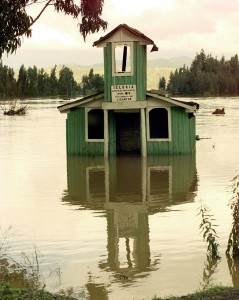But God remembered Noah and all the wild animals and all the domestic animals that were with him in the ark. And God made a wind blow over the earth, and the waters subsided; the fountains of the deep and the windows of the heavens were closed, the rain from the heavens was restrained, and the waters gradually receded from the earth. At the end of one hundred and fifty days the waters had abated; and in the seventh month, on the seventeenth day of the month, the ark came to rest on the mountains of Ararat. The waters continued to abate until the tenth month; in the tenth month, on the first day of the month, the tops of the mountains appeared.
At the end of forty days Noah opened the window of the ark that he had made and sent out the raven; and it went to and fro until the waters were dried up from the earth. Then he sent out the dove from him, to see if the waters had subsided from the face of the ground; but the dove found no place to set its foot, and it returned to him to the ark, for the waters were still on the face of the whole earth. So he put out his hand and took it and brought it into the ark with him. He waited another seven days, and again he sent out the dove from the ark; and the dove came back to him in the evening, and there in its beak was a freshly plucked olive leaf; so Noah knew that the waters had subsided from the earth. Then he waited another seven days, and sent out the dove; and it did not return to him any more.
In the six hundred and first year, in the first month, on the first day of the month, the waters were dried up from the earth; and Noah removed the covering of the ark, and looked, and saw that the face of the ground was drying. In the second month, on the twenty-seventh day of the month, the earth was dry. Then God said to Noah, ‘Go out of the ark, you and your wife, and your sons and your sons’ wives with you. Bring out with you every living thing that is with you of all flesh—birds and animals and every creeping thing that creeps on the earth—so that they may abound on the earth, and be fruitful and multiply on the earth.’ So Noah went out with his sons and his wife and his sons’ wives. And every animal, every creeping thing, and every bird, everything that moves on the earth, went out of the ark by families.
This part of chapter 8 gets more confusing as the two sources have been comingled again. Both P and J have pieces in this part of the flood story.
Apparently after 150 days the water abated and the ark came to rest upon Mount Ararat. Okay, sounds good.
But it rained for 40 days and 40 nights, after which Noah sent out a dove to look to see if the flood was over, but it found no place to land so the dove returned.
Noah waits another seven days and again he sends out the dove. This time the dove returns with a freshly plucked olive tree leaf. But Noah brings the dove back in and waits again another seven days.
Again Noah sends out the dove. This time it does not return.
At this time Noah removes the cover of the ark and God commands him to leave the ark….after 40 days and nights, plus 14 days of waiting for the waters to subside.
Obviously the math does not calculate properly here. How can Noah leave the ark after 54 days, but the ark has not come to rest upon Mount Ararat, which is due to happen 96 days after the flood began?
So was it 54 days or 150 days?
It may in fact have been both. The reason I say this is there is much archeological evidence to support a great flood that occurred roughly 10 000 years ago. Many of the costal regions flooded, never to return, when the ice caps began to melt and sea levels rose.
This type of cataclysmic event would naturally be documented in the sacred texts of many people, which could explain why the days do not line up. But just because the days do not line up does not mean there was not a “Great Flood”.
For instance, here is an example of a 10 000 year village in the English Channel. http://www.livescience.com/history/070809_aqua_dig.html
There are also other examples, a 10 000 year old pyramid off the coast of Japan, another temple complex off the coast of India from the same time period. There obviously was a great flood that people interpreted as an act of God.
So does it matter then that the Great Flood may not have happened, at least not according to the biblical version? Does it matter that the flood can be shown to be the melting of the ice caps after the last ice age?
Maybe it matters to some, but not to me. It doesn’t matter to me whether this story is “true” in the historical sense, it still carries with it many truths that God wishes us to know and understand.
Stewardship of the earth is vital, as we learn from this passage, because the earth is a delicate balance. And if we continue down the current path, then we may see another great flood as the ice caps melt from global warming and New York city disappears, along with many costal towns and cities
Looking beyond the history or interpretation of history, it is always important when reading the Torah to remember that God preserved this story not because of its scientific factual-ness, but because within it is a truth that He wishes us to understand.
So let’s sit down and keep reading our way through the Torah and eventually through the rest of the bible.

